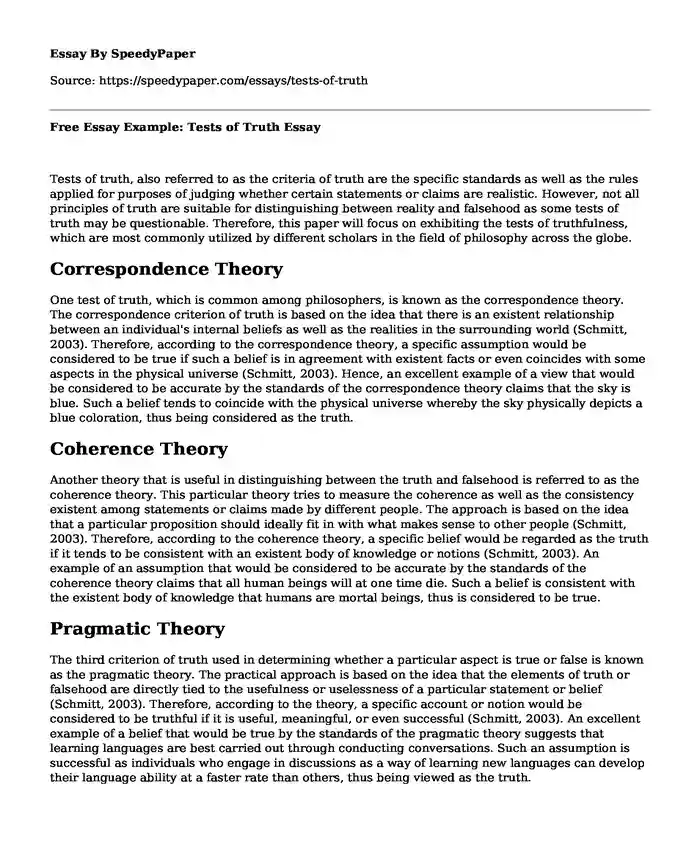
| Type of paper: | Essay |
| Categories: | Philosophy Personality Human behavior |
| Pages: | 3 |
| Wordcount: | 691 words |
Tests of truth, also referred to as the criteria of truth are the specific standards as well as the rules applied for purposes of judging whether certain statements or claims are realistic. However, not all principles of truth are suitable for distinguishing between reality and falsehood as some tests of truth may be questionable. Therefore, this paper will focus on exhibiting the tests of truthfulness, which are most commonly utilized by different scholars in the field of philosophy across the globe.
Correspondence Theory
One test of truth, which is common among philosophers, is known as the correspondence theory. The correspondence criterion of truth is based on the idea that there is an existent relationship between an individual's internal beliefs as well as the realities in the surrounding world (Schmitt, 2003). Therefore, according to the correspondence theory, a specific assumption would be considered to be true if such a belief is in agreement with existent facts or even coincides with some aspects in the physical universe (Schmitt, 2003). Hence, an excellent example of a view that would be considered to be accurate by the standards of the correspondence theory claims that the sky is blue. Such a belief tends to coincide with the physical universe whereby the sky physically depicts a blue coloration, thus being considered as the truth.
Coherence Theory
Another theory that is useful in distinguishing between the truth and falsehood is referred to as the coherence theory. This particular theory tries to measure the coherence as well as the consistency existent among statements or claims made by different people. The approach is based on the idea that a particular proposition should ideally fit in with what makes sense to other people (Schmitt, 2003). Therefore, according to the coherence theory, a specific belief would be regarded as the truth if it tends to be consistent with an existent body of knowledge or notions (Schmitt, 2003). An example of an assumption that would be considered to be accurate by the standards of the coherence theory claims that all human beings will at one time die. Such a belief is consistent with the existent body of knowledge that humans are mortal beings, thus is considered to be true.
Pragmatic Theory
The third criterion of truth used in determining whether a particular aspect is true or false is known as the pragmatic theory. The practical approach is based on the idea that the elements of truth or falsehood are directly tied to the usefulness or uselessness of a particular statement or belief (Schmitt, 2003). Therefore, according to the theory, a specific account or notion would be considered to be truthful if it is useful, meaningful, or even successful (Schmitt, 2003). An excellent example of a belief that would be true by the standards of the pragmatic theory suggests that learning languages are best carried out through conducting conversations. Such an assumption is successful as individuals who engage in discussions as a way of learning new languages can develop their language ability at a faster rate than others, thus being viewed as the truth.
Consensus Theory
Last but not least, another theory is called the consensus criterion of truth. The word consensus customarily refers to an agreement between a group of different individuals. Hence, putting into consideration the definition of the word consensus, the consensus theory is based on the idea that the truth is what a majority of people in public believe (Schmitt, 2003). Therefore, according to the consensus theory, anything which is universally accepted by human beings is undeniably true (Schmitt, 2003). For instance, a belief which would be truthful by the standards of the consensus theory claims that things in life will work out regardless of the circumstances or situation. This particular belief is accepted by a majority of people across the globe as it gives people hope for a better future, thus being considered to be true.
Hence, as exhibited above, the tests of truth are essential in distinguishing between the truth and falsehood. However, each theory has a different approach to establishing the truth, which is not necessarily acceptable or believable in reality.
Reference
Schmitt, F. F. (2003). Theories of truth. Retrieved from https://philpapers.org/rec/SCHTOT-18
Cite this page
Free Essay Example: Tests of Truth. (2023, Jan 09). Retrieved from https://speedypaper.com/essays/tests-of-truth
Request Removal
If you are the original author of this essay and no longer wish to have it published on the SpeedyPaper website, please click below to request its removal:
- Export Financing in Nigeria, Problems and Prospects - Free Essay in Finance
- Essay Example on Genetics of Parathyroid Tumors
- Essay Sample on Conflict Theory, Race and Class Stratification
- Free Essay Example - Interest Groups Contributions
- Free Essay on Application of Theory/Concepts: Interview With an Adolescent
- Paper Example. Concept of Contract Law
- Essay Sample on Meniere Infection
Popular categories




